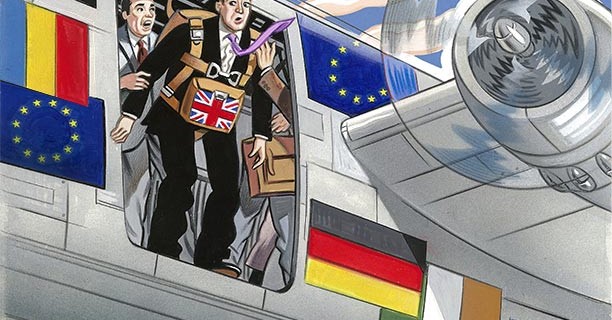Here Are 3 Crazy Scenarios In Which Brexit Doesn’t Happen

The Brexit vote raised more questions than it answered.
Thursday’s Brexit referendum, in which British voters supported leaving the European Union, sent shockwaves through financial markets all over the world.
The pound has plunged. The U.K.’s stock market has dropped more than 5%. Britain has lost its triple AAA rating from both Fitch and Standard & Poors, while Moody’s has cut its outlook to negative. And markets have lost more than $2 trillion.
And, yet, Brexit may not actually happen. Maybe.
The vote that took place on Thursday is not actually binding. Parliament has the ultimate final say on whether the U.K. leaves the EU. And the details—like whether Britain should lobby to stay as a member of the European Economic Area, even if it’s not part of the EU—still has to be worked out by Britain and its trade partners. What’s more, there’s already a growing movement to hold another referendum to reverse the Brexit vote, though many think it has little chance of happening.
This dynamic means that Britain has many more questions than it does answers after last week’s referendum, with some political analysts arguing that a Brexit is not inevitable, despite it winning in the voting booth. Here are three other ways Brexit might not happen at all:
Prime Minister David Cameron ignores the vote
Article 50 of the Lisbon Treaty says that member states that wish to leave the European Union may do so “in accordance with its own constitutional requirements.” To start the process of leaving the European Union requires that member states “shall notify the European Commission of its intention.”
This invocation of article 50 must be done by the Prime Minister. But David Cameron, who has said he will step down by October as a result of the Brexit decision he campaigned against, says that he will leave that up to his successor, who will in theory be someone who supports Britain’s leaving the European Union.
But the pro-Brexit faction of the British political class is very much divided on what sort of Brexit they’d like to see. Some want Britain to remain a part of the European Economic Area, which would enable Britain to take advantage of free trade across the region, but also require it to abide by the freedom of movement provisions that motivated many “leave” voters to come out to the polls in the first place. Others would like to withdraw completely, allowing Britain complete control over its borders, but imposing economically damaging tariffs and other restrictions on British businesses that do trade with Europe.
But even after article 50 is invoked, there’s another two years before Britain and the EU have to negotiate the terms of the withdrawal. If no agreement is reached, trade regulations between the UK and the EU will revert to World Trade Organization rules, meaning the UK will face tariffs on all the goods it sells to the EU. European Union member states, therefore, have much more leverage once the countdown begins.
“Nothing can force the U.K. to press the notification button, and nothing can force the EU to negotiate until it is pressed. It is entirely a matter for a Member State to decide whether to make the notification and, if so, when,” according to legal analyst David Allen Green. “In turn, there is no obligation on the EU to enter into negotiations until the notification is made. There is therefore a stalemate. If this were game of chess, a draw would now be offered.”
Parliament refuses to ratify the referendum
Some legal experts even believe that it would even be unconstitutional for Cameron or his successor to invoke article 50 without getting approval from Parliament first. British legal scholars Nick Barber, Tom Hickman, and Jeff King argued as much Monday morning in the U.K. Constitutional Law Blog Monday morning. “Our democracy is a parliamentary democracy, and it is Parliament, not the Government, that has the final say about the implications of the referendum, the timing of an Article 50 our membership of the Union, and the rights of British citizens that flow from that membership,” they write.
Unfortunately for Brexit supporters, most members of Parliament are in the “remain” camp, and there’s no guarantee that parliament would ratify the decision to leave the EU if a vote were held on the issue, despite the referendum result. Another possibility is that Parliament decides to dissolve itself and call for a new general election sometime this fall. This would give the pro-Brexit contingent some time to organize a detailed plan of what a Brexit would look like in terms of Britain’s trade relationship with Europe. But it could also mean that British voters won’t like the idea of leaving the EU once those details are more clearly fleshed out, and another coalition of pro-EU members of parliament get elected.
Scotland vetoes Brexit
Finally, there’s the chance that the Scottish Parliament—whose constituents voted in favor of remaining the EU—is able to scuttle Brexit on its own. That’s what Nicola Sturgeon, leader of the Scottish National Party argued in interviews this weekend, and a view that is backed up by an inquiry published last month by the British House of Lords. In the inquiry constitutional expert Sir David Edward argued that leaving the European Union would violate the Scotland Act 1998, “which binds the Scottish Parliament to act in a manner compatible with EU law,” and amending that law would require the consent of both British and Scottish parliaments.
In the end, the implications of the Brexit vote are far from certain given the unprecedented nature of a country leaving the European Union altogether. Financial markets are understandably rattled by the decision, and not solely or even largely because Brexit would hinder trade between the U.K. and the rest of the world. What’s more frightening for investors is uncertainty that has been created by the vote. There are many questions yet to be answered regarding Britain’s place in the European Economic Community, and it could be many years until we find the answers.
Source: FORTUNE – Here Are 3 Crazy Scenarios In Which Brexit Doesn’t Happen






























Regarding ‘parliament refuses to ratify’:
Aren’t parliaments in democracies supposed to uphold the public will — specifically when the vote is more recent that the vote for parliament members?
If a parliament voted against its direct people’s vote, that would be the end of democracy.
And about Cameron ignoring the vote, which is pretty much the same as what happened in Greece where people voted ‘No’ to the Memorandum but Tsipras (prime minister) took that as a Yes and did whatever he wanted against people’s direct will.
(Well, democracy was born in Greece, and it apparently also died in Greece.)
Dear TP after all is UK split u should decide for and not EU s .
For me is much better ti see UK leave EU and absolutely even better to become from UK to England . It all started , I expect from British to respect their democracy .